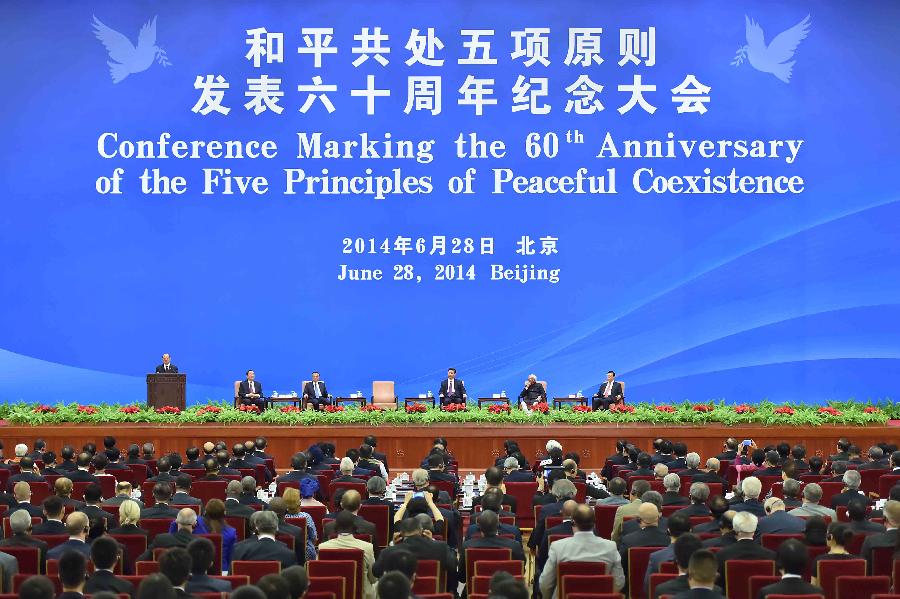 |
| The conference marking the 60th anniversary of the five principles of peaceful coexistence is held in Beijing, capital of China, June 28, 2014. (Xinhua/Li Tao) |
BEIJING, June 28 -- The presidents of China, India and Myanmar on Saturday exchanged congratulatory messages on the 60th anniversary of the Five Principles of Peaceful Coexistence.
Chinese President Xi Jinping, on behalf of the Chinese government and people, extended his warm congratulations and best wishes to his counterparts -- Indian President Pranab Mukherjee and Myanmar President U Thein Sein, as well as their governments and peoples respectively.
Xi said the Five Principles of Peaceful Coexistence initiated by the three countries 60 years ago is a major creation in the history of international relations in the 20th century.
The five principles, which stand for mutual respect for sovereignty and territorial integrity, mutual non-aggression, non-interference in each other's internal affairs, equality and mutual benefit, and peaceful coexistence, have served as the cornerstone of China's independent foreign policy of peace during the past six decades.
The principles have withstood the test of international vicissitudes and have been widely accepted and observed by the international community, Xi said.
The Five Principles of Peaceful Coexistence have become basic norms guiding state-to-state relations and played an important role in safeguarding world peace and the cause of progress of mankind, Xi added.
Under the new circumstance of profound readjustment of the international politic and economic situations, the five principles are still of powerful vigor and vitality, and will definitely make new contributions to the establishment of a new type of international relations featuring equality, mutual trust, inclusion, mutual learning, cooperation and a win-win outcome, Xi said.
China and India have been active practitioners of the five principles, based on which the two neighboring countries have explored a path of harmonious coexistence and common development, Xi said.
The peaceful, cooperative and inclusive development path jointly adopted by China and India not only benefit the peoples of the two countries but is also conducive to maintaining peace, stability and development of Asia and even the whole world, Xi said.
Guided by the five principles, China would like to work with India to push their relations of strategic cooperation and partnership oriented toward peace and prosperity to higher levels, Xi added.
As for relations with Myanmar, Xi said China and Myanmar are traditional friendly neighbors, and there is profound "paukphaw" (fraternal) friendship between the two peoples.
Over the past six decades, the relations of good neighborliness and friendship between China and Myanmar have been increasingly booming after enduring all kinds of tests. The mutually beneficial cooperation between the two countries in various fields has yielded fruitful results, bringing about enormous benefits to the two peoples, Xi said.
"Under the new situation, we would like to work with Myanmar in adhering to the Five Principles of Peaceful Coexistence, sticking to quality and mutual benefit, strengthening mutual trust and mutual assistance, promoting pragmatic bilateral cooperation in all fields, expanding friendly contacts between the two peoples, and promoting sustained, steady and in-depth development of the comprehensive relations of strategic cooperation and partnership between the two countries," Xi said.
"We are also willing to work with all nations in inheriting and carrying forward the Five Principles of Peaceful Coexistence, adhering to sovereign equality, realizing a win-win outcome in cooperation, seeking common security, safeguarding impartiality and justice, advocating a multi-polar world, jointly sharing development achievements, and jointly ushering in an excellent future," he added.
Xi's counterparts Mukherjee and U Thein Sein also sent their warm congratulations and best wishes to Xi, and to the Chinese government and the Chinese people.
Mukherjee said the five principles have been a component in all major bilateral treaties and joint statements between India and China. They also serve as guiding principles for the two countries to deal with relations between them as well as their relations with other countries in Asia and even the whole world.
To commemorate the 60th anniversary of the peace principles, India and China have decided to set the year 2014 as "India-China Friendship and Exchange Year," in which the two countries will hold a series of events, according to Mukherjee.
The Indian president said he believed that those events will deepen the mutual understanding and friendship between the two peoples, and push forward the strategic and cooperative partnership between the two countries.
U Thein Sein said the five principles embody the will of Asian nations and other developing countries to realize independence as well as the purposes and tenets of the U.N. Charter, conform to the historical tide of peace and development, and meet the common interests of the people of the whole world.
He believed that Myanmar, China and India will deepen their mutual understanding and cooperation through this commemoration, and further firmly adhere to the Five Principles of Peaceful Coexistence, thus working together on peace, stability and prosperity of their region and the whole world.
The Myanmar president believed that the "paukphaw" friendship between Myanmar and China, as well as their comprehensive strategic and cooperative partnership, will be promoted to new levels on the basis of the five principles.

 Picturesque Shangli Ancient Town
Picturesque Shangli Ancient Town National fitness team shows support to the World Cup
National fitness team shows support to the World Cup Greening desert, Beautiful China - World Day to Combat Desertification Special
Greening desert, Beautiful China - World Day to Combat Desertification Special In Pictures: Female fans of World Cup
In Pictures: Female fans of World Cup Glimpse of Longmen Grottoes
Glimpse of Longmen Grottoes Stewardesses in Brazilian soccer jerseys
Stewardesses in Brazilian soccer jerseys Training details of female PLA honor guards unveiled
Training details of female PLA honor guards unveiled Graduation photos of students with Xi’an Jiaotong University hit the Internet
Graduation photos of students with Xi’an Jiaotong University hit the Internet Beauties in World Cup
Beauties in World Cup Culture insider: China, birthplace of football
Culture insider: China, birthplace of football
Day|Week|Month